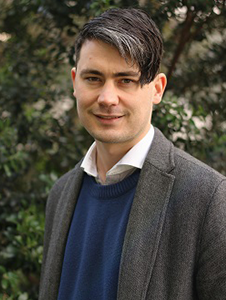 Jamie Manning
Jamie Manning
School of Biomedical Sciences researcher Jamie Manning is proud to have overcome several challenges to become the first member of his family to gain a PhD.
Based in the School's Department of Pharmacology and Toxicology, Manning is proud of the milestone.
“I come from a large rural family and am both privileged and fortunate to be one of the few to have completed university study.”
Manning's journey to postgraduate study began as a second-year undergrad, when he took a pharmacology paper by chance and “really enjoyed the subject matter”.
He changed his major the following semester.
“Understanding how humans have developed medicines and therapeutic goods was very interesting to me and so, after completing my Bachelor of Science with Honours at the University of Auckland in 2017 with Professor Michelle Glass, I decided I wanted to continue and do doctoral research in the same lab.”
When Professor Glass decided moved to her lab to the University of Otago in 2018, Manning decided to follow and start his PhD at Otago.
Not knowing anyone at Otago was challenging but, over time, he's found people to be “very welcoming” and has formed meaningful friendships.
His PhD was also heavily disrupted while a new laboratory was set up, and then the COVID-19 pandemic hit, which meant he could not undertake the MacGibbon PhD travel fellowship in human health research fellowship in a research lab at Columbia University in New York City.
“The fellowship was an amazing opportunity, which funded a three-month project in a research lab in New York, but this was bittersweet because I almost immediately had to return home to New Zealand with the outset of the COVID-19 pandemic.
“I caught one of the last New Zealand-bound flights from the airport before the borders closed, so I did not get to do any actual science while I was there, but I am so grateful to the MacGibbon foundation for funding this trip because it enabled me to secure a postdoctoral research position in the same lab!
“In hindsight, I am happy to say the trip amounted to something very valuable in the end.”
Arriving back in New Zealand at the height of the pandemic meant that he was repeatedly unable to access lab space, but he used this opportunity to modify experiments, increasing their efficiency and the amount of data that could be collected.
Manning's lab work is pre-clinical, molecular-scale research to assist in the development of new types of drugs that target cannabinoid receptors, which are responsible for cannabis' effects, such as intoxication and potential medicinal effects, including pain relief.
There are no approved man-made drugs that target these receptors, so Manning's PhD explored how the type-1 cannabinoid receptor responded to a range of different drugs.
The aim was to show if new types of drugs targeting the cannabinoid receptor – called biased ligands – can be developed and if they would be effective. He found some key assumptions about cannabinoid receptor function (often used for drug development) may be false. He also identified new strategies to target the receptor to get desired cellular results.
Manning looks forward to continuing his research in his new postdoctoral research position in the molecular therapeutics lab at Columbia University in the city of New York from September, 2022.
- Kōrero by the School of Biomedical Sciences Communications Adviser, Kelsey Schutte.